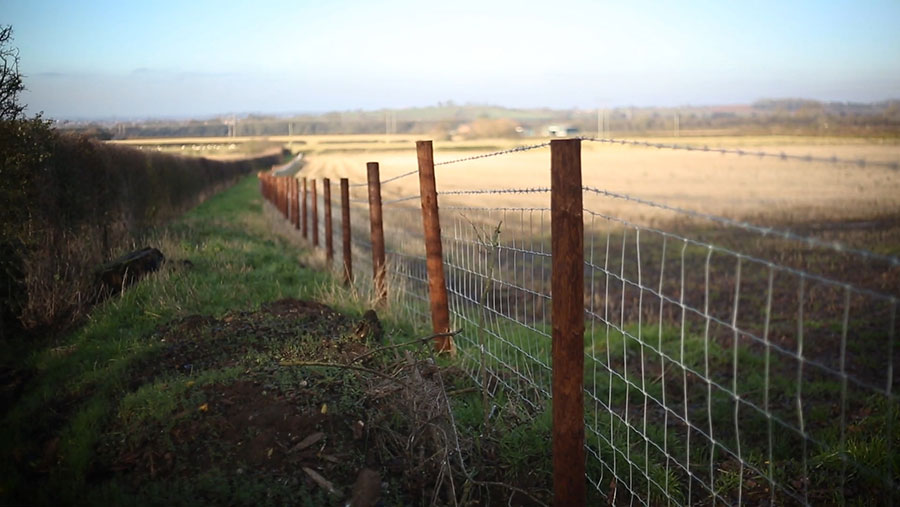Grants of up to £5,000 to help with practical green measures
 © Severn Trent Water
© Severn Trent Water Up to £5,000 of match-funding is available to help farmers in the Midlands invest in measures to protect water and the environment.
Severn Trent Water is offering the funding to those in 44 priority catchments, with the focus on options that prevent pesticides, nitrates or cryptosporidium reaching water.
Measure that could qualify include pesticide washdown areas, biobeds and biofilters, precision pesticide application kit, cover crops, livestock fencing and hardstandings for drinking troughs.
The funding is available through the Severn Trent Environmental Protection Scheme (Steps), which is open for applications until 31 January 2021.
Priority items
Pesticide catchment areas
Pesticide washdown areas, including roofing
Grass margins
• Biobeds and biofilters
• Alternative weed management in grassland fields
• Precision pesticide application equipment
Nitrate catchment areas
• Cover crops
• Grass margins
Cryptosporidium catchment areas
• Livestock fencing along watercourses
• Hard bases for drinking troughs
• Roofed livestock handling and manure storage areas
• Constructed wetlands
Adam Freer, senior catchment management scientist at Severn Trent, said: “Farmers can choose from an array of funded items, but to ensure your application is competitive, we’d strongly recommend choosing a priority item for your specific area.”
See also: Covid-19 Bounce Back Loan top-up option introduced
Applicants can also suggest their own innovative ideas to tackle these issues of concern through a farmer innovation option in the scheme.
While Steps-funded investments can improve farm productivity and protect the environment, the benefit to water quality also reduces treatment costs and therefore keeps customer bills as low as possible, said Dr Freer.
Tips for applying for Steps
- Find out if you are eligible using the Steps priority catchment map
- Speak to your local agricultural adviser to find out what the priority issue and funding options are in your catchment
- Visit the Severn Trent Water website to fill out your application
- Focus applications on priority items for the best chance of being accepted
- Those hoping to apply for a biodiversity option in the spring round of Steps must ensure they apply for, or have historically received funding for, a priority item
Case study – using Steps to benefit mixed farm
Leamington-based Robin Davies received funding to help install more than 1,100m of livestock fencing and gates.
“We used a contractor to put in fencing 1.5m either side of two hedged ditches that carry water from the Leam and Itchen rivers,” says Mr Davies.
This not only helps keep the flock of 200 North Country Mules safe from the ditches, but also protects against bacteria and nitrates from the sheep entering the watercourse.
Trees have also been planted inside the fence line to create habitats for other species while improving shelter for the sheep.
“We farm in a very traditional manner, and conservation is close to our hearts. We don’t use any fertiliser and keep sprays to a minimum – this works well for both us and the local environment.
“The arable reversion to pasture should help to improve soil fertility and microbial activity for future crops, but will also benefit the sheep by providing a ‘clean’ ungrazed pasture,” says Mr Davies, who may also consider applying for a Steps biodiversity grant to contribute to his wild bird seed cover strip.
Severn Trent is the UK’s second biggest water company, serving 4.1m homes and businesses in and around the Midlands. Its region stretches from the Welsh borders to Rutland and from the outskirts of Sheffield south to the Bristol Channel and east to the Humber.
The company has a target to increase biodiversity across an area of 5,000ha within the region by 2027. This will deliver 1% of the Nature Recovery Network’s 500,000ha, within the government’s 25 year Environment Plan.
To achieve this, in addition to the Steps match-funding described above, it is looking for more partners, including conservation organisations, farmers, estate managers and other landowners to help with:
- Planting more than 1.3m trees
- Establishing wildflower meadows, beetle banks and creating wetlands
- Restoring moorland
- Bog and peatland restoration.
